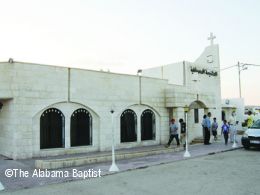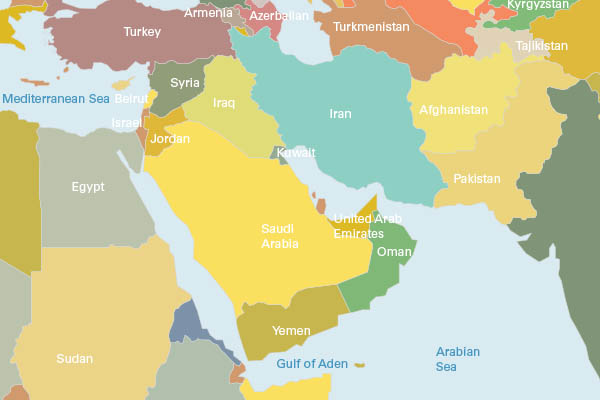We believe in church growth,” said Pastor Nabeeh Abbassi, attempting to be serious as he looked around the nearly empty parking lot of his church just a few minutes before the scheduled start of the Sunday evening worship service.
“We start our church services on time and grow the attendance for the next half hour,” he said jokingly.
Abbassi was hosting 10 of us from the United States Sept. 24. As he joked about the amount of people late for the service, he showed us around the church complex located in the village of Husn in northern Jordan.
For 12 years, Abbassi has served the church, which started in a home and then moved to a rented facility. Now the church meets in a nearly new white-block building marked by a cross proudly displayed from the top of a small, squarish steeple.
Pointing to the fence around the nearly acre of ground owned by the church, Abbassi said it encloses the largest land site owned by any of the 20 Baptist churches in Jordan. “Most churches build on a quarter of an acre. They have to go straight up with their building because there is no land. There is no parking.”
This site provides more than a place of worship. On its paved parking lot, a group of teenage boys kicks a soccer ball. At one end of the parking lot, a tattered basketball goal stands.
The parking lot provides one of the few usable recreational sites in the village, where most of the vacant land is cluttered with rocks and stones, he explained.
On one end of the building is a wing labeled Medical Clinic. The major feature is a fully equipped dental office. Abbassi explained that a volunteer dentist recently moved from the community and now the office is unused.
“That is one of the prayers you can join us in,” he said. “We need a volunteer dentist. It is a wonderful outreach for us. It shows that Christians care about the people in our village.”
The building has a library, a fellowship hall, a nursery, a few classrooms for children. Nothing is that unusual to the eyes of a Baptist from Alabama, but in Jordan, where Christians make up about 8 percent of the population and Baptists number less than 1,300 baptized believers, Husn Baptist Church is a marvelous facility.
The sanctuary has about 100 upholstered chairs arranged in seven neat rows with a few chairs along the back of the room. The ceiling is low.
This night as the service began, the lights dimmed. Most of the adult women moved directly toward a basket just left of the entry door and picked up a lace headscarf to cover their head. Most women cover their head in Baptist services, Abbassi explained.
Fans mounted along the white-block walls provided a comfortable relief from the warm evening temperature.
The notes of an electronic keyboard sounded through two large speakers, one on each side of the platform. Words to the choruses flashed on a screen from a projector mounted on the ceiling.
The worship leader, Kamal Mansoun, a graduate of Jordan Evangelical Theological Seminary (JETS), led the congregation in songs and prayers.
By now, the room was almost full. The singing was strong but dignified. One could hear the traditional Arabic sound in the music. None of the tunes were familiar to the Americans.
Mansoun wore a black suit, white shirt and tie. Abbassi wore a clerical collar. Appearance is important in Jordan, Abbassi explained. “People expect pastors to wear pastors’clothes. That is why I wear a clerical collar. When I do not, the community does not accept me as a pastor.
“You cannot be taken seriously if you wear jeans or shorts. Those are clothes of children, not of adults,” he added.
The Sunday night service was the only service of the day. In Jordan, Sunday is a regular workday. The weekend for the country is Friday, the Muslim holy day, and Saturday.
Practically all Baptist churches meet on Sunday evening. Some Husn Baptist members are able to go by their home before the 6:30 service, but many come directly from work. Some go back to work when the worship service is over.
Thursday evening is the second service of the week. Abbassi said that service is a time of singing and praying followed by a Bible study. He said the teacher would ask questions and dialogue with the congregation, much like a classroom setting. It is the primary Bible study time for adults.
Friday is the day children gather at the church for Bible study. It is much like Sunday School in the United States but held on Friday when Muslims are at their mosques.
Pastor Abbassi’s sermon this night was about Jesus leaving the disciples. The gospel spread across the world because of the faithfulness of the disciples, he reminded the congregation.
It was a poignant message because tonight Abbassi shared the announcement the church has known was coming for two years. He is resigning.
In addition to serving as pastor, Abbassi teaches at JETS. He is also president of the Jordan Baptist Convention, a post he believes needs additional attention.
“This church does not need me anymore,” he confided afterward. “They have a good leadership team ready to replace me.”
He said he would devote more time to his role as convention president and then start a new work or help one of the weaker churches closer to Amman, where he lives and works. Husn is about an hour and a half north of Amman.
Following the sermon, the church celebrated the Lord’s Supper. Abbassi picked up a large, flat piece of bread and tore it in half. Then he placed each half in a silver bread plate. He took one tray and Mansoun took the other.
They also each took a tray of juice cups and stood on either side of the platform.
Christians came forward, tore off a piece of bread, took a cup and returned to their seat. After all had come who wished to participate, Abbassi led the congregation in eating the bread and drinking the juice.
Then it was time for the offering. Two men took deep, wine-colored velvet bags attached to small handles that the ushers hold and passed the bags in front of everyone present.
Following the dismissal prayer, most of the members lingered in the hallway and parking lot, visiting as Baptists do in churches all across Alabama.
Evidently they enjoy being with fellow believers. Abbassi explained that fellowship time is especially important when one is such a minority as Baptists are in Jordan with its 92 percent Muslim population.





Share with others: